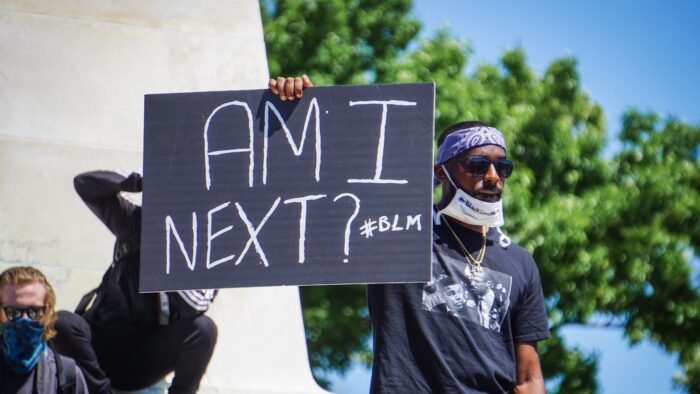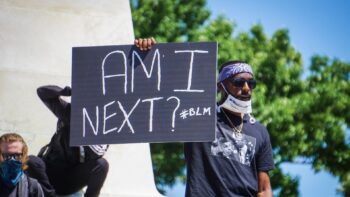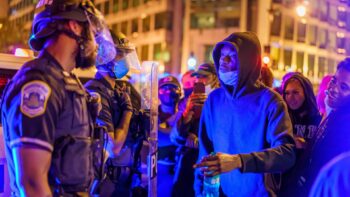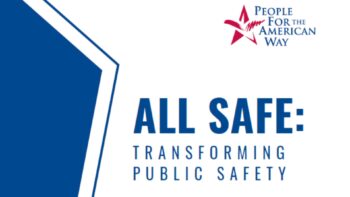
This fact sheet is part of People For the American Way’s new report All Safe: Transforming Public Safety. Here, we give an overview of one of the four prongs in our approach to reducing police violence: Holding unfit officers responsible and accountable for their actions.
Problem: It is far too difficult to hold unfit officers responsible for misconduct. Police unions and police union contracts and qualified immunity are some key reasons for this difficulty, among others.
Solution: Bring transparency and accountability to numerous arenas that affect police activity, including the police union contracting process, the undue protections offered to police accused of misconduct through police union contracts and through various state-level law enforcement bill of rights (LEBOR), the unjustified existence of qualified immunity, DOJ recordkeeping, and the well-regulated use of body-worn cameras (BWCs).
Key Facts
- Unions impose barriers to removing officers accused of misconduct. At the state level, unions have passed police officer “bills of rights,” which provide extensive protections for officers not afforded to other individuals in similar situations.
- Almost all the Key Metro Areas [where most Black Americans live] have a police union contract that hinders efforts at increasing police accountability. For example, a contract may prevent officers from being interrogated until 48 hours after the incident, which may allow officers time to review evidence and coordinate their testimony. Or contracts may require the destruction of misconduct records after some period of time, making it difficult to monitor whether officers are repeat offenders. Only Atlanta, Charlotte, Norfolk-Virginia Beach-Newport News, and Richmond are in states that prohibit police union contracts.
- The judicial doctrine of “qualified immunity” protects officers from lawsuits even when officers violate victims’ civil rights, and prevents victims from seeking relief to which they’re entitled.
- The House of Representatives has passed the George Floyd Justice in Policing Act, which would end qualified immunity. The Senate has failed to do so. Action at the state level is a more promising avenue for ending qualified immunity.
- There is an absence of reliable data on police killings. Despite being legally required to report each police killing, police departments do not, and if they do, they often provide incomplete or inaccurate data.
- More needs to be done to ensure that accurate and complete data on arrest-related deaths are available. The United States Department of Justice must fully comply with the Death in Custody Reporting Act, which requires it to collect adequately and to report accurately all data on deaths occurring during police custody in all states and U.S. territories
- Historically, unionized police forces were formed as a reaction to the civil rights movement’s focus on police brutality and racism. Unions continue to resist measures designed to increase police accountability.
- Police officer union leadership is often substantially less diverse than the officers they represent and the communities they serve: Of the 15 largest police departments in which a majority of officers are people of color, only one, Memphis, has a union leader who is Black.
- Recent studies show mixed results regarding the effectiveness of body-worn cameras. One study of over 2,000 police officers in Washington, D.C. found that BWCs had minimal effect on officer behavior. But another recent study found that BWCs reduced the use of police force.
- BWCs can only be as useful as the manner in which they are implemented. The effectiveness of BWCs will depend on when they are required to record, whether officers can review footage, and how the footage will be released.
Learn More About Transforming Public Safety
|
|
|
|


